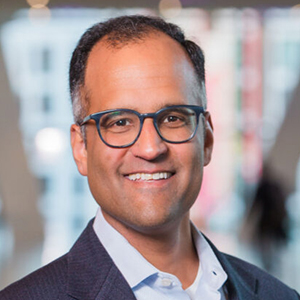It is increasingly accepted that cell and extracellular matrix structure and mechanics can drive biology and disease, influencing everything from metabolism to stem cell differentiation to tumor progression. While significant progress has been made in developing culture technologies that mimic the complex physical microenvironment of tissue, many of these platforms are comparatively static in nature.
There remains a need to understand how cell-matrix dynamics influence cell behavior. For example, how do cells remodel the carefully constructed matrices in which we place them, and how does this remodeling drive the biology we observe? And how does the time-dependent dissipation of cell-imposed stresses influence force-based signaling?

Sanjay Kumar,
UC Berkeley
While the answers are far from clear, I will describe efforts our team has made to attack these challenging problems, ranging from the use of proteomics to characterize the matrisome of invasive tumor cells ensconced within 3D matrices to to development and application of viscoelastic matrices to probe effects of stress relaxation on stem cell lineage commitment.
Sanjay Kumar, M.D., Ph.D., is Chancellor’s Professor and Director of the California Institute for Quantitative Biosciences at UC Berkeley (QB3-Berkeley). His primary appointment is in the Department of Bioengineering (which he chaired from 2019-22), with joint appointments in the UC Berkeley Department of Chemical and Biomolecular Engineering, the UCSF Department of Bioengineering and Therapeutic Sciences, and Lawrence Berkeley National Laboratory.
Dr. Kumar earned his B.S. in chemical engineering at the University of Minnesota (1996) and his M.D. and Ph.D. in molecular biophysics from Johns Hopkins University (2003). He then completed postdoctoral training at Boston Children’s Hospital and Harvard Medical School.
Dr. Kumar has co-authored >100 peer-reviewed publications and mentored >30 graduate students and postdoctoral fellows. He and his group have been recognized with the Presidential Early Career Award for Scientists and Engineers (PECASE), The NIH Director’s New Innovator Award, The Beckman Young Investigator Award, the NSF CAREER Award, and the Stem Cells Young Investigator Award. Dr. Kumar is an elected fellow of AAAS, AIMBE, and BMES, and he is a member of the BMES Board of Directors.